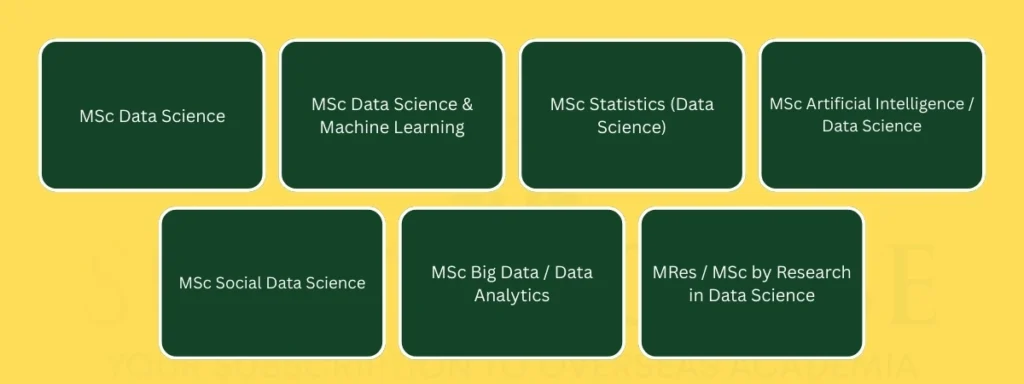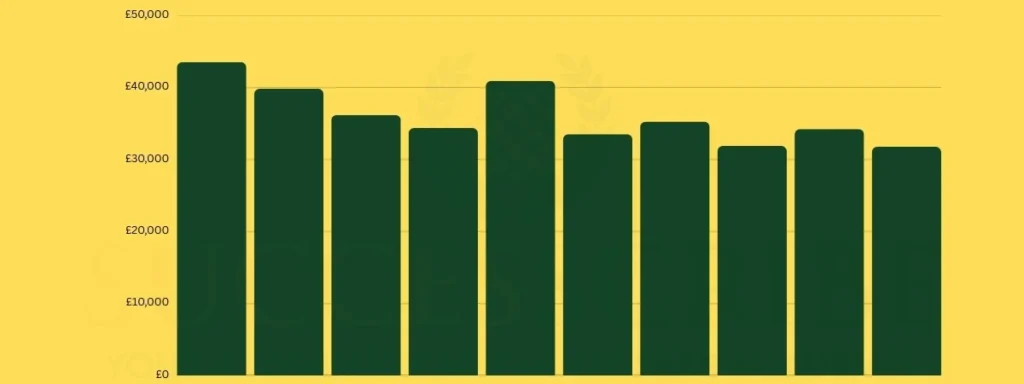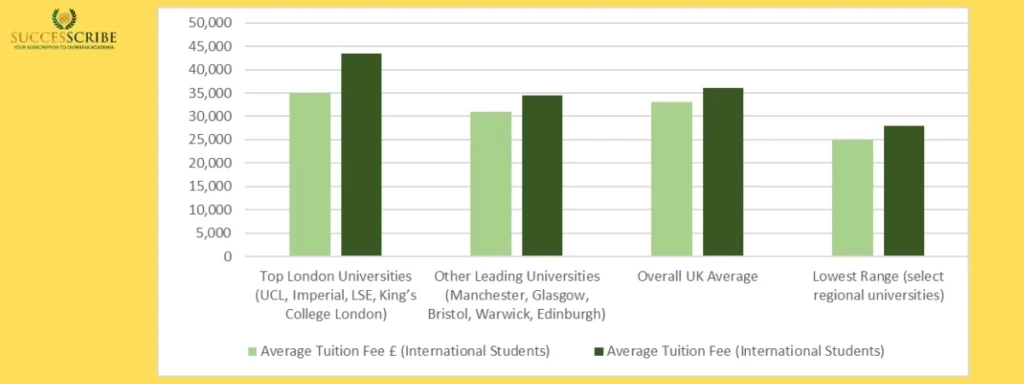The global datasphere is growing at an unprecedented rate. By 2025, it’s estimated that 463 exabytes of data will be created each day globally. In this data-driven epoch, the ability to extract meaningful insights from complex information is not just a valuable skill, it’s a critical economic driver. The demand for data expertise is skyrocketing, making a Masters in Data Science in UK a strategic choice for future-ready careers. The United Kingdom, with its world-renowned universities, thriving tech sector, and forward-thinking immigration policies, has positioned itself as a premier destination for aspiring data scientists seeking to master this craft.
Key Highlights – Masters in Data Science in UK
| Aspect | Details |
| Program Duration | 12 – 18 months (full-time) |
| Tuition Fees | £18,000 – £45,000 per year (₹16 – 56 lakh) |
| Living Costs | £11,000 – £13,500 (outside London)£15,000 – £18,000 (London) |
| Types of Programs | MSc Data Science, MSc Data Science & AI, MSc Big Data Analytics, MSc Business Data Science |
| Top Universities | Cambridge, Imperial, UCL, LSE, Manchester, Warwick, Bristol |
| Entry Requirements | 2:1 Bachelor’s in CS/Maths/Engineering, IELTS 6.5–7.0 or TOEFL 90–100, GRE (some universities) |
| Course Modules | Statistics, Programming (Python/R), Machine Learning, Data Visualisation, AI, Research Project |
| Assessments | Exams, coding assignments, group projects, dissertation/capstone |
| Scholarships | Chevening, Commonwealth, GREAT, Inlaks, Gates Cambridge, University-specific awards (£5,000 – £45,000) |
| Average Graduate Salary | £35,000 – £55,000/year (₹32 – 52 lakh) |
Why Study Data Science in the UK?
Here are the top reasons why study Masters in Data Science in UK:
| Factor | UK Advantage | Why it Matters |
| Global Rankings | 4 UK universities rank in the Top 50 worldwide for Computer Science & Data Science-related fields (Oxford, Cambridge, Imperial, UCL). | Shows world-class teaching & research credibility. |
| Course Duration | Most MSc programs are 12 months (compared to 24 months in US/Canada). | Saves 1 year of time and £10,000–£20,000 in living costs. |
| Tuition Costs | Average tuition £25,000–£38,000; US Ivy equivalents often cost $60,000+ (£47,000) per year. | Lower upfront investment, faster ROI. |
| Living Costs | Average UK student living expenses: £12,000–£15,000/year outside London; London £18,000/year. | Transparent budgeting vs other study destinations. |
| Post-Study Work | Graduate Route allows 2 years stay after MSc (3 for PhD). | Provides time to secure jobs in UK market. |
| Industry Demand | UK data science job postings grew 35% median salary £55,000. | High employability & attractive salaries. |
| Research Output | UK produces 15% of global AI/Data Science research papers. | Exposure to cutting-edge innovation. |
| Location Advantage | London is Europe’s top tech hub, attracting 25%+ of European VC funding in AI/data startups. | More internship & job opportunities. |
Types of Data Science Master’s in the UK

A Masters in Data Science in UK offers specialized programs to match different career goals in technology and business.
| Types of Program | Focus Area | Typical Duration | Suitable For |
| MSc Data Science | Core mix of data analysis, machine learning, statistics, and programming. Industry-driven with projects. | 12 months | Students with STEM/quantitative background seeking balanced training. |
| MSc Data Science & Machine Learning | Strong focus on AI, neural networks, and applied ML techniques alongside data science foundations. | 12 months | Students aiming for ML engineer or AI specialist roles. |
| MSc Statistics (Data Science) | Heavy statistical methods, probability, modelling, Bayesian inference, with some ML. | 12 months | Students with mathematics/statistics background interested in research/analytics-heavy roles. |
| MSc Artificial Intelligence / Data Science | Applied AI systems, robotics, NLP, computer vision, with data-driven problem-solving. | 12 months | Students wanting careers in AI R&D or applied AI in industry. |
| MSc Social Data Science | Use of data science in social sciences, policy, economics, and behavioural research. | 9–10 months | Students from economics, sociology, political science, or psychology backgrounds. |
| MSc Big Data / Data Analytics | Focus on data engineering, cloud platforms, and business intelligence tools. | 12 months | Students aiming for roles in industry data analytics, consulting, or business tech. |
| MRes / MSc by Research in Data Science | Research-focused, less taught coursework, dissertation-heavy. Pathway to PhD. | 12–24 months | Students planning academic or research careers in data/AI. |
Suggested Post: Letter of recommendation for study abroad
Top UK Universities for Data Science

The “best” university depends on your profile, career goals, and specialisation interests. The following table categorizes leading institutions based on their strengths. Fees, reputation, and industry exposure are key factors when selecting a university for a Masters in Data Science in UK.
| University | Approximate International Tuition Fee | QS / Global Ranking / Quality Indicator |
| University College London (UCL) – Data Science MSc | £43,500 | Very high (UCL is among the top 10 globally in many data science / computer science rankings). |
| UCL – Data Science & Machine Learning MSc | £39,800 | Similarly very high; strong reputation in ML/data research. |
| London School of Economics & Political Science (LSE) – Data Science MSc | £36,168 | Very high; especially strong for statistics, social data science & economics-adjacent data roles. |
| Imperial College London – Data Science / ML-related programmes | £34,350 | Among the world’s top; excellent for theory, ML, engineering & strong industry links. |
| University of Edinburgh – MSc Data Science | £40,900 | Top tier, especially strong in AI, research, and interdisciplinary data work. |
| University of Manchester – MSc Data Science | £33,500 | High quality; large cohorts; good balance of research & applied training. |
| King’s College London – MSc Data Science | £35,244 | Prestigious university; strong visibility; good employer links in London tech / finance. |
| University of Glasgow – MSc Data Science | £31,860 | Good quality; often more affordable compared to London-based options. |
| University of Bristol – MSc Data Science | £34,200 | Strong academic reputation; good in computational and statistical modules. |
| University of Warwick – MSc Data Science / Data Analytics | £31,750 | Highly respected; often good return-on-investment, strong employer connections, business/analytics options. |
Entry requirements (what selection committees look for)
Admissions to a Masters in Data Science in UK is highly competitive. Admissions committees don’t just look at grades; they want a full package – strong academics, coding ability, math foundations, and a clear motivation for why you’re choosing data science. Most programs evaluate applicants on a mix of academic background, quantitative skillset, coding ability and motivation:
What UK Universities Look For in Data Science Applicants
| Requirement | What It Means | Example from Top Universities |
| Strong Academic Background | A good first degree (usually UK 2:1 equivalent, 60–65%+) in Computer Science, Mathematics, Statistics, Engineering, or Physics. | UCL asks for a high 2:1 in a quantitative field; Manchester accepts maths-heavy disciplines. |
| Mathematics & Statistics Skills | Solid knowledge of linear algebra, probability, calculus, and statistics. | Imperial emphasizes strong probability and linear algebra. |
| Programming Proficiency | Experience in Python, R, Java, or C++ is expected. Proficiency in programming languages like Python or R is often expected for a Masters in Data Science in UK. | UCL requires programming familiarity; Edinburgh wants coding + computational skills. |
| English Language Proficiency | IELTS: 6.5–7.5 overall (with band minimums), or TOEFL/PTE equivalents. | Oxford: IELTS 7.5 (no band <7.0). UCL: IELTS 7.0. |
| Professional / Research Experience (Optional) | Industry projects, internships, or research can boost your profile. | LSE values experience in economics, social sciences, or analytics. |
| Personal Statement (SOP) | Must show motivation, research interests, and career goals aligned with the course. | Oxford & LSE highlight fit between applicant’s goals and program strengths. |
| References | Usually 2 academic referees vouching for your analytical and research skills. | Imperial and UCL require two references. |
| Projects / Portfolio (Bonus) | Industry/project experience is a plus for industry-facing degrees or conversion courses. A small portfolio (GitHub projects, Kaggle notebooks, research papers) can significantly strengthen your application. | Not mandatory but increasingly valued by selection panels. |
Why These Requirements Matter
- Grades show discipline knowledge – but math + coding ability prove you can handle the intensity of UK Data Science MScs.
- Personal statements & references act as tie-breakers for strong pools of candidates.
- Extra projects or work experience often separate “good” applications from “outstanding” ones.
Visa Information for International Students
- Visa Type: Student Visa (formerly Tier 4).
- Application Fee: £490 (approx. ₹45,000).
- Immigration Health Surcharge (IHS): £776 per year (mandatory for access to NHS healthcare).
- Funds Required (Proof of Maintenance):
- £1,334/month if studying in London (up to 9 months = £12,006).
- £1,023/month if studying outside London (up to 9 months = £9,207).
- Work Rights: Up to 20 hours/week during term and 40 hours/week during holidays.
- Visa Validity: Course duration + 4 months.
- Graduate Route: After completion, students can stay and work in the UK for 2 years (3 years for PhD graduates).
Tuition Fees for Masters in Data Science in UK

Tuition fees for a Masters in Data Science in UK vary, with top London universities charging higher fees than regional institutions.
| Category | Average Tuition Fee (International Students) | Approx. Cost in INR (₹) | Key Highlights |
| Top London Universities (UCL, Imperial, LSE, King’s College London) | £35,000 – £43,500 | ₹32 lakh – ₹40 lakh | Premium fees due to global ranking, central London location, and strong employer connections. |
| Other Leading Universities (Manchester, Glasgow, Bristol, Warwick, Edinburgh) | £31,000 – £34,500 | ₹29 lakh – ₹32 lakh | More affordable compared to London, still globally ranked with excellent academic reputation. |
| Overall UK Average | £33,000 – £36,000 | ₹30 lakh – ₹33 lakh | 1-year program makes UK more cost-effective than US/Australia. |
| Lowest Range (select regional universities) | £25,000 – £28,000 | ₹23 lakh – ₹26 lakh | Smaller cities with lower living costs; fewer but growing data science programs. |
Living Cost for International Student in UK
Here is the Genric Overview of Living Cost for an International Student in UK:
| Expense Category | Monthly Cost (Outside London) | Monthly Cost (London) | Annual Cost Range |
| Accommodation (Rent) | £450 – £750 | £700 – £1,200 | £5,400 – £14,400 |
| Food & Groceries | £180 – £250 | £220 – £320 | £2,200 – £3,800 |
| Transport (Public Travel Card) | £50 – £80 | £120 – £180 | £600 – £2,100 |
| Utilities & Bills (Gas, Electricity, Internet) | £120 – £180 | £150 – £220 | £1,400 – £2,600 |
| Study Materials (Books, Software, Printing) | £40 – £60 | £40 – £70 | £500 – £800 |
| Personal & Leisure (Shopping, Fitness, Entertainment) | £120 – £200 | £150 – £250 | £1,400 – £3,000 |
| Miscellaneous & Healthcare | £50 – £80 | £60 – £100 | £600 – £1,200 |
Course Structure – Masters in Data Science in the UK
A Masters in Data Science in UK combines core modules, electives, and research or industry projects to build technical expertise.
The table below highlights typical modules and assessment methods.
| Semester / Stage | Typical Core Modules | Elective / Specialisation Options | Assessment Methods |
| Semester 1 (Foundation) | – Statistics & Probability for Data Science- Programming in Python/R- Data Management & SQL | – Big Data Technologies- Business Analytics | – Written exams- Coding assignments- Lab work |
| Semester 2 (Advanced) | – Machine Learning- Data Visualisation- Artificial Intelligence | – Natural Language Processing (NLP)- Deep Learning- Cloud Computing for Data Science | – Case studies- Group projects- Oral presentations |
| Semester 3 (Application) | – Research Methods- Advanced Analytics- Ethics & Governance in Data Science | – FinTech Analytics- Healthcare Data Science- Cybersecurity Analytics | – Research essays- Applied projects- Practical lab tests |
| Final Stage (Dissertation / Capstone) | – Independent Research Project- Industry-Based Capstone Project | – Choice of academic or industry focus | – Thesis submission- Viva (oral defense)- Project presentation |
How to pick the right course (checklist)
- Curriculum match – does the program prioritise the sub-fields you want? (ML, statistics, engineering, applications).
- Project & industry exposure – capstone projects, internships, or industry partner placements add real-world experience.
- Faculty & research strength – look for faculty working in your applied area (NLP, computer vision, causal inference).
- Tools & cloud – does the course teach modern tools (Python ecosystem, Spark, Docker, Kubernetes, cloud platforms)?
- Careers & employer outreach – check past employer lists and graduate employability stats.
- Location & living costs – London costs more; some regional universities offer comparable quality for lower living costs.
- Scholarship & funding – competitive programs may reduce fees through scholarships.
Scholarships, Bursaries & Funding for Indian Students – MSc Data Science in the UK
Around 40–50% of Indian students in the UK rely on scholarships or part-funding. Part-time work can reduce annual living expenses by £8,000 – £10,000. Over 3,000 Indian students received UK scholarships in the last 2 years. Several scholarships and funding options are available for Indian students pursuing a Masters in Data Science in UK.
| Scholarship / Funding Route | Coverage & Value | Eligibility (Key Criteria) | Application Timeline |
| Chevening Scholarships | Full tuition + living allowance (£18,000/year) + travel | Indian students with 2+ years’ work experience, strong leadership profile | Opens Aug; Deadline Nov (for next year intake) |
| Commonwealth Master’s Scholarship | Full tuition + monthly stipend (£1,347 outside London / £1,652 in London) + airfare | From Commonwealth nations (India included), strong academic merit & financial need | Opens Sept; Deadline Dec |
| GREAT Scholarship (UK-India) | £10,000 towards tuition fees | Indian students applying to partner UK universities (e.g., Manchester, UCL, Warwick) | Jan – May |
| Inlaks Shivdasani Foundation Scholarship | Up to US $100,000 (£80,000) covering tuition & living | Indian students under 30, admitted to top-ranked UK universities | Jan – March |
| Gates Cambridge Scholarship | Full tuition + maintenance allowance (£20,000/year) + travel | Exceptional academic record, leadership, contribution to society | Sept – Oct |
| University-Specific Scholarships (e.g., Imperial Global Excellence, UCL India Merit Award) | £5,000 – £20,000 tuition fee reduction | High academic merit + admission to MSc programs | Deadlines vary by university (Jan – June) |
| Part-time Work (20 hrs/week during term, 40 hrs in holidays) | £10 – £15 per hour (£800 – £1,200 per month) | Any Tier 4 student visa holder | Throughout studies |
Career prospects – Roles, sectors, and salary ranges

Data science graduates enter many roles across sectors (tech, finance, healthcare, retail, government, consultancy). Graduates of a Masters in Data Science in UK have strong career opportunities across technology, finance, healthcare, and consulting sectors. These are indicative – actual pay depends on employer, region (London vs elsewhere), sector, and skillset.
| Role | Typical entry salary (UK) | Mid-level / Senior |
| Data Scientist | £45,000 – £60,000 | £60,000 – £110,000+ (lead/manager) |
| Machine Learning Engineer | £40,000 – £60,000 | £60,000 – £120,000+ |
| Data Analyst | £28,000 – £40,000 | £40,000 – £65,000 |
| Data Engineer | £35,000 – £55,000 | £55,000 – £100,000 |
| Business Intelligence Developer | £35,000 – £50,000 | £50,000 – £80,000 |
| Analytics Consultant | £35,000 – £55,000 | £55,000 – £90,000 |
| Research Scientist (AI/ML) | £40,000 – £60,000 | £70,000 – £120,000+ |
Conclusion
A master’s in Data Science from the UK combines intensive technical training, a short time-to-degree, and a concrete post-study work route – making it a practical choice for many international students. The ROI depends on: (a) your prior skillset, (b) ability to convert classroom learning into demonstrable projects, (c) location and sector you target, and (d) how actively you use careers and networking opportunities during the program. A Masters in Data Science in UK is not only academically rewarding but also strategically advantageous for career growth. If your goal is a fast transition into the UK tech or analytics job market, pick a program with a strong capstone/industry project, sharpen your Python and statistics skills before you start, and plan the first 6 months onboard for networking and interviews. Use the Graduate Route strategically to move into a sponsored role if you want longer-term settlement plans.
FAQs
What are typical tuition fees for international students for Masters in Data Science in UK?
Broadly £13,000–£40,000+, with top universities generally in the £25k–£38k band. Always confirm on the official course page for the intake year.
What salary can I expect after graduating?
Early-career roles typically £35k–£55k; median data scientist pay across the UK is often reported around £50k–£60k, with London salaries higher on average.
Do I need a programming background?
Yes at least basic Python and SQL. Some conversion courses accept applicants with strong quantitative degrees but limited coding; however, prior coding experience increases your chances.
Which course is better – MSc Data Science or MSc Statistics (Data Science)?
If you prefer models and theory, choose a statistics-heavy course. If you want applied ML, software engineering pipelines and product-facing skills, choose data science/ML engineering courses.
Related Post
Masters in Artificial Intelligence in UK
Masters in robotics in UK
Best mba colleges in uk for Indian student
MBA in UK without work experience















